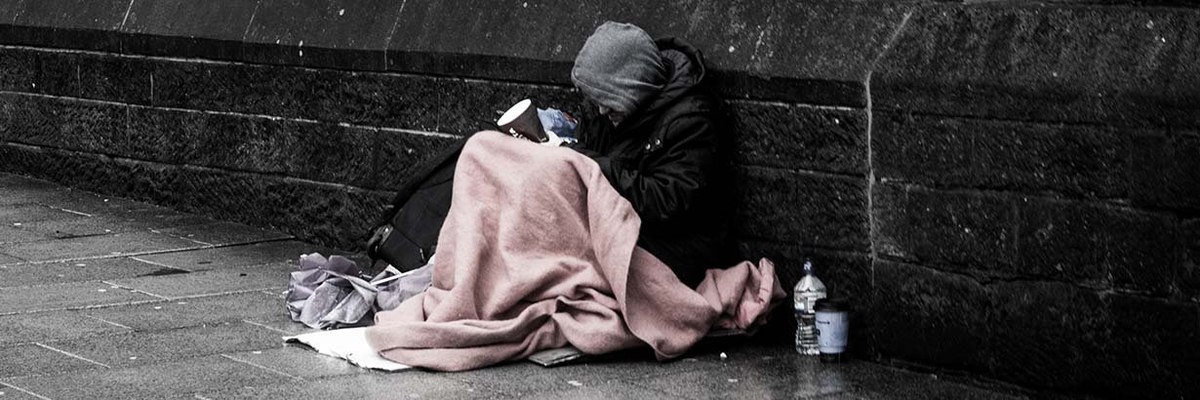Britons are divided on whether most homeless people are to blame for their situation
As the cost of living crisis bites, and the shortage of affordable housing in Britain continues to hit the headlines, analysis from the homelessness charity Crisis and Heriot-Watt University suggests that 300,000 households will be at risk of homelessness this year.
Now, new YouGov data sheds some light on public attitudes towards homelessness and how the government should be tackling it.
Britons are divided on why people end up being homeless
When it comes to what Britons think leads people to homelessness, the largest number (40%) take the view that most homeless people probably had a bad start in life and have been treated unfairly by society. Labour voters are particularly likely to take this view (55%) compared to Conservative voters (24%).
However, 32% instead believe that most homeless people have themselves to blame, having made bad choices that led to their situation. Conservative voters are most likely to endorse this view (45%), compared to only 20% of Labour voters believing this to be the case.
How big a priority should reducing homelessness and providing social housing be for local authorities?
From a list of 12 responsibilities placed on local authorities by national government, three in ten Britons (30%) consider reducing homelessness to be a top-three priority for council spending. This puts it on a par with children’s social services, but behind provision of social care (42%), and maintaining the roads (34%). Social housing came next in the rankings, tied with bin collections and recycling, with 26% overall considering these to be a top priority for local authorities.
Few Britons are keen to give their own money to the homeless
Most Britons would be unlikely to give money directly to a person who appeared to be homeless. Only 17% of Britons would be likely to give money to someone who approached them on the street, versus seven in ten (68%) who say they would be unlikely to.
When asked why they wouldn’t give money, the most common reason given, at 38%, is the expectation that the money would end up being spent on alcohol and drugs. Some are also doubtful that the individual would really be in need (14%), with 7% suggesting that the homeless should be earning their own money, not asking others for it. A third (32%) say they simply cannot afford to give money to people.
Instead, 34% say they would prefer to buy the individual something rather than giving them money, with a quarter (25%) believing their money to be better spent donating to a homelessness charity.
A third of Britons believe there are more homeless people in their local area than there were ten years ago
According to latest figures from the ONS, there were 2,440 rough sleepers in England in 2021. This is up slightly from 1,768 people in 2010, but is down from a peak of 4,751 in 2017.
Our data shows that a third (33%) of Britons now believe there to be more homeless people in their local area than there were ten years ago, down from 47% in 2018, whilst a further 34% have not seen any change, with only 6% believing it to have reduced.
In London and other urban areas, rough sleeping, the most visible form of homelessness, is a larger problem than elsewhere in the country. The Combined Homelessness and Information Network (CHAIN) report that 8,329 people slept rough in London in 2021, with their latest report finding that 3,628 people in London slept rough between July and September 2022.
This is reflected in the results. Those living in urban areas are much more likely to believe homelessness to have risen over the last ten years (35%), compared to those in town and fringe areas (21%) and rural areas (26%). Those in London are particularly likely to believe there to be more homeless people now than ten years ago (44%).
Britons don’t believe the government is doing enough to tackle homelessness
Two thirds (65%) of Britons believe that the government is not doing enough to tackle homelessness in the UK, with only one in nine (11%) believing they are doing enough and just 2% believing they are doing too much. Labour voters are especially likely to believe the government are doing too little (81%), with half of Conservative voters (51%) also saying so.
When it comes to choosing which homeless groups the government should be prioritising in the face of a shortage of housing, people with dependent children and victims of domestic violence come top
When allocating their limited housing stocks, local authorities have a system of ‘priority need’ to ensure that housing is first given to those most in need of it, as opposed to those who have been waiting for longest. But who would Britons prioritise if they were deciding?
The two groups that the most Britons believe are in the greatest need are people with dependent children (48%), and victims of domestic violence (42%). Elderly people (33%) and military veterans (26%) also score highly. Lower priority for many Britons are people with addiction problems (3%) and refugees (5%).
Picture: Getty








